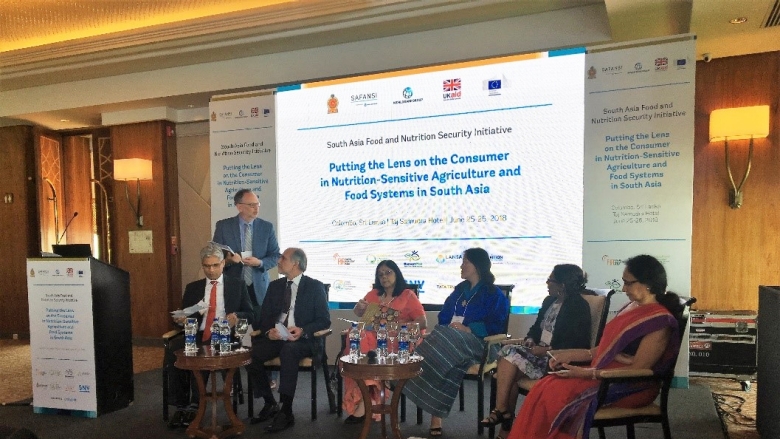Despite ongoing economic growth, increasing agricultural productivity, and declining poverty, the South Asia region continues to face challenges in reducing malnutrition and micronutrient deficiencies. Although progress has been made in recent decades, the region’s average stunting (low height-for-age) and wasting (low weight-for-height) rates remain high, at 33 and 12 percent, respectively.
There is a difference between food, in general, and nutritious food: while food may provide you with enough calories for a day, nutritious food will provide adequate calories along with sufficient micro- and macro-nutrients. However, there is an ongoing struggle to deliver nutritious food to the consumer, due to a variety of issues, such as insufficient cold storage infrastructure which makes transportation of fruits and vegetables difficult, or increasing availability, access, and affordability of innutritious foods. By better understanding the consumer, including drivers such as taste, affordability, and tradition, and how these factors impact how and what people eat, we may find a key to improving the diets of many consumers across South Asia.
At the end of last month, more than 160 government representatives, civil society organizations, private sector members, international donors, practitioners, and stakeholders from around South Asia convened at a regional roundtable “Putting the Lens on the Consumer in Nutrition-Sensitive Agriculture and Food Systems in South Asia”. The roundtable highlighted the need to engage with consumers, drawing on the latest evidence from current nutrition-sensitive and nutrition-specific policies and programs.
The Presidential Secretariat of the Government of Sri Lanka highlighted the importance of increasing investment in food systems with the objective of improving nutrition and spoke of the Enterprise Sri Lanka Credit Programme, which will invest in young entrepreneurs in the fields of agriculture, fisheries and other small and medium enterprises: “…our President last week orchestrated the need to give a break to the farmers and the poor, small and medium industry investors due to this emerging need, when he addressed the initiation of a program for entrepreneurial upgrading and upscaling.” These investments, he stressed, are a key part of reducing and fighting poverty.
Across the two days of the roundtable, guests considered a broad range of topics, from engaging the private sector to better addressing and creating consumer demand to better improve the nutrition of foods that people consume. One session was on biofortification, discussed by Dr. Ashish Wele, an independent consultant and previous President of Nirmal Seeds. He spoke about his experiences developing iron-rich pearl millet in India and of the need to address invisible problems, such as micronutrient deficiency, with investment, from government and from the private sector. The invisible nature of these issues can make it difficult for us to make investments, but that makes focusing on them even more essential. Another session on working to engage the private sector, in which Dr. Nelum Vithana, Head of Health and Nutrition at Cargills Sri Lanka, discussed the desire of the private sector to be involved in improving consumer nutrition. She emphasized that the private sector can work to see that healthy food is available throughout the year, and that she is eager to be a part of this important work.
Dr. Said Shamsul Islam Shams, Coordinator of the Technical Secretariat for the Afghanistan Food Security and Nutrition Agenda Stakeholders, said of the event “Stakeholders in food systems must realize that their successes and failures depend on each other. Alone, no one can succeed in the food system. I am excited that I now know individuals and institutions who I can approach and discuss the challenges facing our country’s food systems…I am not alone in this long and a holey journey, helping poor people access what they deserve and are entitled to.”
The event was sponsored by the South Asia Food and Nutrition Security Initiative (SAFANSI), which is administered by the World Bank with funding from the UK Government, and the European Commission. Other partners were Food Industry Asia, Nutrition International, LANSA, HarvestPlus, Public Health Foundation of India, SUN Business Network, SUN Movement, SNV, Tata Trusts, Global Panel on Agriculture and Food Systems for Nutrition, and UNICEF.
Through these events, SAFANSI supports regional multi-sectoral, collaborative efforts towards more integrated food and nutrition security actions, working with existing knowledge networks to develop a strong cadre of advocates, policy-makers, and practitioners.
Attendees were eager to continue discussions, creating linkages, sharing policies, and sharing knowledge with one another. A third Roundtable is in the works for 2019.


